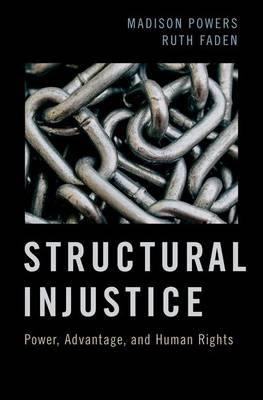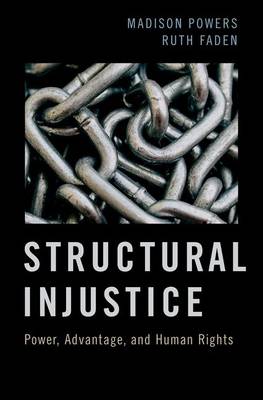
- Retrait gratuit dans votre magasin Club
- 7.000.000 titres dans notre catalogue
- Payer en toute sécurité
- Toujours un magasin près de chez vous
- Retrait gratuit dans votre magasin Club
- 7.000.0000 titres dans notre catalogue
- Payer en toute sécurité
- Toujours un magasin près de chez vous
Structural Injustice
Power, Advantage, and Human Rights
Madison Powers, Ruth Faden
Livre relié | Anglais
169,45 €
+ 338 points
Format
Description
Madison Powers and Ruth Faden here develop an innovative theory of structural injustice that links human rights norms and fairness norms. Norms of both kinds are grounded in an account of well-being. Their well-being account provides the foundation for human rights, explains the depth of unfairness of systematic patterns of disadvantage, and locates the unfairness of power relations in forms of control some groups have over the well-being of other groups. They explain how human rights violations and structurally unfair patterns of power and advantage are so often interconnected. Unlike theories of structural injustice tailored for largely benign social processes, Powers and Faden's theory addresses typical patterns of structural injustice-those in which the wrongful conduct of identifiable agents creates or sustains mutually reinforcing forms of injustice. These patterns exist both within nation-states and across national boundaries. However, this theory rejects the claim that for a structural theory to be broadly applicable both within and across national boundaries its central claims must be universally endorsable. Instead, Powers and Faden find support for their theory in examples of structural injustice around the world, and in the insights and perspectives of related social movements. Their theory also differs from approaches that make enhanced democratic decision-making or the global extension of republican institutions the centerpiece of proposed remedies. Instead, the theory focuses on justifiable forms of resistance in circumstances in which institutions are unwilling or unable to address pressing problems of injustice. The insights developed in Structural Injustice will interest not only scholars and students in a range of disciplines from political philosophy to feminist theory and environmental justice, but also activists and journalists engaged with issues of social justice.
Spécifications
Parties prenantes
- Auteur(s) :
- Editeur:
Contenu
- Nombre de pages :
- 324
- Langue:
- Anglais
Caractéristiques
- EAN:
- 9780190053987
- Date de parution :
- 27-09-19
- Format:
- Livre relié
- Format numérique:
- Genaaid
- Dimensions :
- 157 mm x 239 mm
- Poids :
- 521 g

Les avis
Nous publions uniquement les avis qui respectent les conditions requises. Consultez nos conditions pour les avis.






